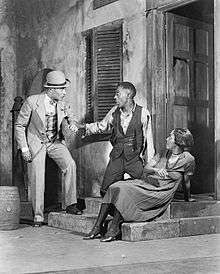Frank H. Wilson
Frank Henry Wilson (May 4, 1886 – February 16, 1956)[1] was an American stage, radio, and film actor.
Frank H. Wilson | |
|---|---|
 Frank H. Wilson (center) as Porgy, with Percy Verwayne and Evelyn Ellis in the original Broadway production of Porgy (1927) | |
| Born | Frank Henry Wilson May 4, 1886 Harlem, New York |
| Died | February 16, 1956 (aged 69) Queens, New York |
| Occupation | Actor |
| Years active | 1914–1954 |
| Spouse(s) | Effie King (stage name of Anna Green; maiden; 1887–1944) |
| Children | Emmett Barrymore Wilson (1923–2013) |
Career
His father was Thomas M. Wilson. Frank started out in show business in vaudeville and minstrelsy.[2] He appeared in many plays, including the original 1927 version of Porgy with Rose McClendon and Evelyn Ellis. In 1922, he appeared in Eugene O'Neill's play All God's Chillun Got Wings and a revival of O'Neill's The Emperor Jones in 1925.[3] He was also cast in Clifford Odets' 1949 play The Big Knife.
He made his film debut in 1932 and later played in films that had stage origins: The Emperor Jones (1933) and Warner Bros.' Green Pastures (1936) and Watch on the Rhine (1943). Wilson made his television debut in 1953 before dying in 1956.
Selected filmography
| Year | Title | Role | Notes |
|---|---|---|---|
| 1932 | The Girl from Chicago | Wade Washington | [4] |
| 1933 | The Emperor Jones | Jeff | [4] |
| 1936 | The Green Pastures | Moses | [4] |
| 1940 | Paradise in Harlem | Lem Anderson | Also writer (original story)[4] |
| 1941 | Murder on Lenox Avenue | Writer (original story)[4] | |
| 1941 | Sunday Sinners | Writer (original story)[4] | |
| 1943 | Watch on the Rhine | Joseph | [4] |
| 1946 | Beware | Professor Drury | [4] |
Family
Wilson, on June 12, 1907, married actress Effie King, the stage name of Anna Green (maiden; 1888–1944). They married in Manhattan at St. Mark's Methodist Episcopal Church on West 53rd Street, a block that was a cultural center for artistic and intellectual African Americans. Effie King, at the time, was a dancer and contralto who performed as a duet with Lottie Gee (née Charlotte O. Gee; 1886–1973), a dancer and soprano in African-American vaudeville circuits. From about 1911 through 1913, King and Gee were known as Ford Dabney's Ginger Girls.[5]
References
- Vazzana, Eugene Michael, Silent Film Necrology (2nd ed.), McFarland & Company (2001), p. 571; OCLC 999814903; ISBNs 0-7864-4515-7; 978-0-7864-4515-8
- Who Was Who in the Theatre: 1912-1976, vol. 4 Q-Z, p. 2592, originally published annually by John Parker; this 1976 & final edition compiled by Gale Research Company.
- Stanley Appelbaum, Great Actors & Actresses of the American Stage in Historic Photographs, c. 1983, p. 69.
- "Frank Wilson". AFI Catalog of Feature Films. American Film Institute. Retrieved 2017-10-04.
- "Theatrical Comment" (re: "Effie–King & Gee–Lottie in Vaudeville") (photo), New York Age, June 12, 1913, p. 6 Newspapers.com; subscription required)
External links
| Wikimedia Commons has media related to Frank H. Wilson. |